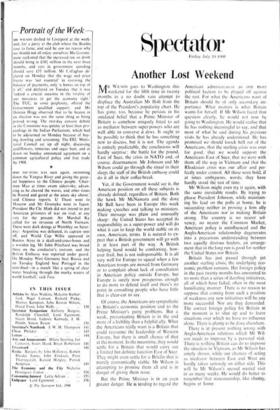Another Lost Weekend
MR WILSON goes to Washington this weekend for the fifth time in twenty months in a no doubt vain attempt to displace the Australian Mr Holt from the top of the President's popularity chart. He has gone, too, because he persists in his outdated belief that a Prime Minister of Britain is somehow uniquely fitted to act as mediator between super-powers who are well able to converse a deux. It ought to be possible to think that he has something new to discuss, but it is not. The agenda is entirely predictable. the conclusions will hardly surprise : the battle for the pound. East of Suez, the crisis in NATO and, of course, disarmament. Mr Johnson and Mr Wilson could go through the ritual in their sleep; the staff of the British embassy could do it all in their coffee-break.
Yet, if the Government would see it, the American position on all these subjects is already defined, regardless of Britain. Both the hawk Mr McNamara and the dove Mr Ball have been in Europe this week making speeches and talking to ministers. Their message was plain and unusually sharp: the United States has accepted its responsibility as a super-power and will do what it can to keep the world stable on its own, American, terms. It is natural to ex- pect that a British government will go with it at least part of the way. A British helping hand would be comforting, how- ever frail, but is not indispensable. It is all very well for Europe to squeal when a few American troops are moved from Germany or to complain about lack of consultation in American policy outside Europe, but Europe is surely now prosperous enough to do more to defend itself and there's no point in consulting people who have little that is clear-cut to say.
Of course, the Americans are sympathetic to Britain's economic position and to the Prime Minister's party problems. But a weak, prevaricating Britain is in the end more of a liability than a helpful ally. What the Americans really want is a Britain that could reassume the leadership of Western Europe, but there is small chance of that at the moment. In the meantime, they would settle for a Britain that would carry out a limited but definite function East of Suez. They might even settle for a Britlin that is merely economically viable. Mr Wilson is attempting to promise them all and is in danger of giving them none.
But the Prime Minister is in an even greater danger. He is tending to regard the American administration as one more political faction to be played off against the rest. For what the Americans want of Britain should be of only secondary im- portance. What matters is what Britain wants for herself. If Mr Wilson faced that question clearly, he would not now IN going to Washington. He would realise that he has nothing meaningful to say. and that most of what he said during his previous visits he has already undermined. He has promised we should knock hell out of the Americans. that the sterling crisis was over for good, that we would support the Americans East of Suez, that we were with them all the way in Vietnam and that the Rhodesian crisis was our affair and per- fectly under control. All these were bold, if at times ambiguous, words; they have hardly stood the test of time.
Mr Wilson might even try it again, with the same inevitable results. By trying to please President Johnson, while maintain- ing his lead on the polls at home, he is succeeding neither in proving a firm ally of the Americans nor in making Britain strong. The country is no nearer sol- vency, no nearer the Common Market, American policy is uninfluenced and the Anglo-American relationship degenerates into a precarious understanding between two equally devious leaders. an arrange- ment that in the long run is good for neither the United States nor Britain.
Britain has just passed through yet another sterling crisis; the underlying eco- nomic problem remains. Her foreign policy in the past twenty months has amounted to no more than a series of dazzling initiatives, all of which have failed, often in the most humiliating manner. There is no reason to suppose that coming from such a position of weakness any new initiatives will be any more successful. Nor are they demanded. The correct foreign policy for Britain at the moment is to shut up and to leave situations over which Ore have no influence alone. There is plenty to be done elsewhere.
There is -at present nothing wrong with Anglo-American relations which Mr Wil- son needs to improve by a personal visit. There is nothing Britain can do to improve the situation in Vietnam, as Mr Wilson has amply shown, while our chances of acting as mediator between East and West are hardly taken seriously on either side. This will be Mr Wilson's second wasted visit in as many weeks. He would do better to remember that statesmanship, like charity, begins at home.






























 Previous page
Previous page